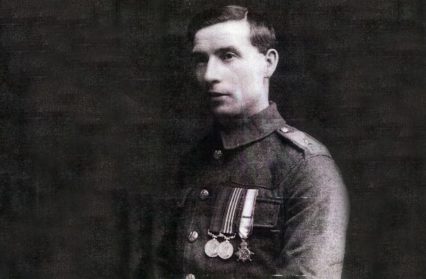David Cottis attends the Jeff Teare directed Old Soldier theatre production which is adapted from Old Soldiers Never Die and Old Soldier Sahib by Frank Richards. Old Soldier will be showing at the Melville Centre in Abergavenny on the 2nd November 2018.

Sometimes, it isn’t just about the show. Anything one says about Old Soldier is always going to be overshadowed by the circumstances of its production, and the death of its adaptor and director, Jeff Teare, who collapsed on the day of its dress rehearsal, and died three days later. It’s no disrespect to the actors’ Sean Carlsen and Alison Lenihan who carried on with the production in difficult circumstances, or to Richard Davies, who kept it on the road for this return to the Melville Centre, to say that all the foyer conversation was about one person.
Like many people involved in theatre in South Wales, I knew Jeff, though not well. He did two weekends of research and development on Alma, a new musical for which I wrote book and lyrics, and to which Jeff brought his particularly pragmatic style of direction, always coming back to questions of rhythm and communication; ‘In the end, you’re either in show business or you’re not. And if you are, you’ve got to think about your audience.’
Entering the theatre, you could immediately see this clean, clear aesthetic – two chairs with rugs and side tables, one from early in the last century, one from (roughly) the present day. These become occupied by our two characters – Frank Richards, who joined the Royal Welch Fusiliers in 1901, at the age of seventeen, and his (now adult) daughter, Margaret.
Richards was a career frontline soldier, refusing promotion above the rank of Sergeant, and his two books are valuable in their telling of two stories – of the Indian colonies and the First World War – that are more usually narrated by the officers and the poets (although, ironically, it was Robert Graves, who was both a poet and Richards’ commanding officer, who first suggested that he write).
Teare’s adaptation is non-chronological, so that, in Sean Carlsen’s nuanced performance, we hear Richards’ stories – from the wonders of India to ‘the biggest rat I ever saw’ at Mametz Wood – coming up much as they would if you met him in the pub. Between these, we hear biographical interventions from Margaret, played by Alison Lenihan. It’s these that give the piece its shape and structure – a daughter gradually coming to understand and embrace her father, who comes across as a paradoxical man, fiercely working-class yet staunchly Tory, critical of the top brass, but always loyal to the army and the military life.
Jeff Teare lived in the theatre as Frank Richards did in the army – his own difficulties in dealing with the top brass may have been one reason why he didn’t so much as work as he would have liked, especially in later life. In this final show, he returned to the milieu in which he’d begun – the community centres and working men’s clubs of Durham, where he toured shows before his careers at the National Theatre, Stratford East and Made in Wales. It’s a low-key, well-managed exit; not a summary of all that went before like The Tempest or Abbey Road, more a return to the source, and a last salute from one old soldier to another.
Other Wales Arts Review articles that discuss both Frank Richards and Frank Teare are available.
David Cottis is an avid contributor to Wales Arts Review.
Novels by Jeff Teare are available from here.











